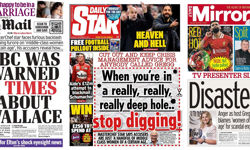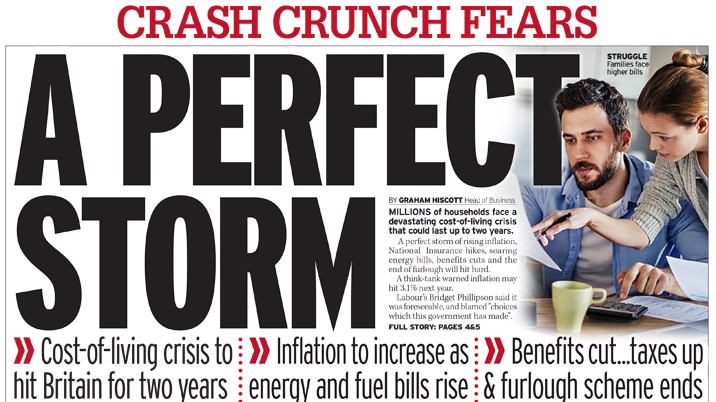
UK crises – not giving the full picture
The gaps on supermarket shelves are growing. Food prices are rising. Electricity prices are rising. National Insurance contributions are rising. Personal income tax allowances are being frozen. The temporary increase in universal credit is being withdrawn.
Low-paid workers are being squeezed from almost every direction. How comforting will they find the headline assurances that “Christmas won’t be cancelled” when they’re worried about whether they’ll be able to feed their families next month?
Yesterday’s Daily Mirror splash, “A perfect storm”, pulled together some of the immediate concerns caused by the surge in gas prices and the carbon dioxide shortage. But while these are “this week’s” issues, there is much more at play here that has been drip-fed to the newspaper-reading, television-watching public over recent months: the red tape required to overcome the hurdles of deliveries to Northern Ireland and trade with the EU, the shortage of lorry drivers, the shortage of people to gather harvests – be they fruit or grain, the shortage of abattoir workers, the shortage of vets to carry out certification. Every day seems to bring a new crisis, another government bung to plug the latest hole.
The Government likes to put all this down to Covid and to insist that we are going through a blip that will solve itself “as the economy bounces back”. Remainers tend to put it all down to Brexit, pointing to the full shelves on the Continent, while brushing aside the fact that America and Germany are finding it just as hard to recruit lorry drivers as we are.
The truth, of course, is somewhere in the middle. There is a surge in demand for energy as the whole world reawakens from the pandemic and Mr Putin is delighting in turning the thumbscrews rather than the gas tap. The whole of Europe is indeed seeing frightening rises in energy prices, but there are additional factors that make us more vulnerable: our biggest gas storage facility was closed four years ago (a minister at the time said that didn’t matter because imports were easy) so stocks are low, a fire interrupted supplies from France, and our wind farms have been becalmed.
All of this has found its way into most papers in some form or other, but – as ever – no one has painted a full, honest picture.
Biased analysis
All of this has found its way into most papers in some form or other, but – as ever – no one has painted a full, honest picture. The government-supporting papers that campaigned to leave the EU do all they can to avoid using the word “Brexit” – other than to accuse Remoaners of not getting over it; the anti-government papers lay every ill at Boris Johnson’s door. It’s true that he is happy to foster the perception that his is a “new” government, totally separate from the Cameron and May administrations – in both of which he served. We have been under Conservative rule for 11 years; it’s a bit rich to play the new kids coming to the rescue. But not everything is his fault, any more than it is the EU’s, as the Express would have us believe.
The Times and Sun have this week both concluded that “power failures” are to a large extent the result of poor decision-making in the not-so-distant past, but they still seem to absolve the Prime Minister of culpability. And, given their fixation with migrants storming the Kent beaches in their inflatables, they are hardly likely to encourage Priti Patel to take a softer stance on short-term visas for EU workers we desperately need now. You can see why she doesn’t want to: thin end of the wedge and all that. But is this admirable resolve or ideological intransigence? For if British workers can’t or won’t do the jobs that need doing now – as opposed to next month or next year when they might have been retrained – then her attitude boils down to “let them suffer”. Is this what people voted for in the referendum or in the 2019 general election? I would quite like to see at least one newspaper – from Left or Right, Leave or Remain – paint a complete portrait of the UK today (not Boris’s vision for it ten years hence) and ask that simple question.
Positively Panglossian
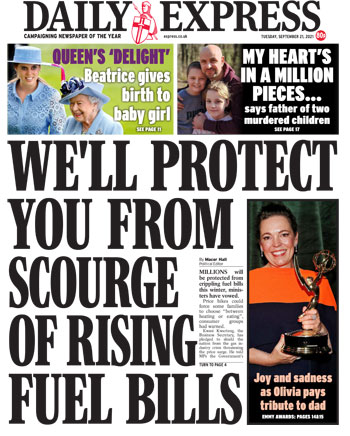
That paper certainly won’t be the Daily Express. Whenever people complain about all the doom and gloom in the papers, journalists sigh and patiently explain that “good news doesn’t sell”. Murder and mayhem bring in the readers, comfy cuddles don’t. As the New Day discovered the hard way in its short lifespan as the “good news paper”. But when it comes to the Johnson government, the Express adopts a relentlessly panglossian approach.
On Tuesday, it promised “We’ll protect you from scourge of rising fuel bills”, which was a downright lie. Nothing is going to protect people from rising fuel bills. Even without the current gas crisis, Ofgem’s energy price cap was going to be lifted next month; everybody is going to be paying more very soon. In a tacit acceptance of that harsh reality, the inside spread (baldly asserting “there will be no winter gas shortage”) offered tips on how to save energy. These included such nuggets as turn off lights when you’re not in the room, use draft excluders and if it’s not cold, turn the heating off.
It’s a wonder the list didn’t include “put another jumper on”.
Tuesday’s fiction was further exposed in this morning’s splash which spoke of “spiralling fuel bills” and urged the Government to increase pensioners’ winter fuel allowance – adding fantasy to fallacy. It ain’t gonna happen.
How much more it will cost us to heat our homes we have yet to discover. But such selective quoting of ministers in an attempt either to propagandise for the Government or to reassure gullible readers is nothing short of irresponsible.
It would be bad enough if Tuesday’s effort were a one-off. But the two heating splashes were sandwiched yesterday with more piggy lipstick: “Britain pushes for mega trade deal with US”.
Mega trade deal, really?
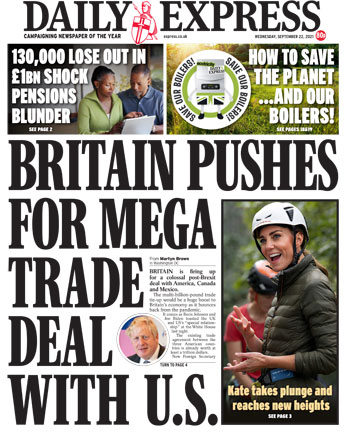
As the Guardian and i put it bluntly in their splashes, President Biden is in no hurry to sign any deal with the UK and the Government knows and acknowledges as much. What the Express was talking about was a possible detour via the existing tripartite pact the US has with Canada and Mexico – which also made the splash for the Times – but even that is a bit hopeful. It’s only an idea being floated by people who aren’t actually in either government.
Still, if you’re a veteran Express reader, you’ll know that these are all unnecessary machinations. For the Sunday paper told us on August 28, 2019 “UK-US trade deal is done”.
It’s a wonder the list didn’t include “put another jumper on”.
How will the doctor see you now?

The Mail is quite the campaigning paper and when it gets its teeth into something, it is more tenacious than a bulldog with a bone. It has long been nibbling at GPs, whom it seems to regard as lazy and unhelpful, but now it’s using its fangs. “Let’s get back to seeing GPs face-to-face” it cried on Monday. The Prime Minister helpfully agreed, providing Tuesday’s splash “Boris: GPs must see us face to face”.
Yesterday the story was moved back inside as the paper was apparently even more eager for ageing protesters to be jailed for jamming up the M25, but it still provided a spread headlined “The great GP surrender”. This was not, as you might imagine, GPs surrendering and agreeing to see patients face to face or even patients surrendering to the reality of seeing GPs on Face Time, but the promotion of a quote in which a spokesman for Silver Voices, “a campaign group for the over-60s” accuses the chairman of the Royal College of GPs of “shrugging his shoulders and surrendering before the battle is over”. The battle being the quest for more resources. Hmmm.
How things have changed over the years. Years that have seen a whole range of “The doctor will see you…” headlines. Take the one in May 2015, when it was “…in a month”. There was, said the splash back then, a shortage of GPs and those still in practice were overworked. So they predicted that before long the average wait for an appointment would be two weeks – and a month in busy areas.
Come October, the doctor would see you “now…on webcam”. But these were private appointments, for which you would pay £30 to avoid the wait.
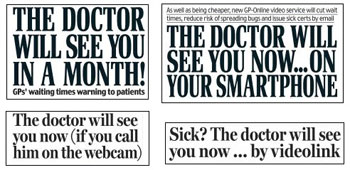
By January, the technology was simpler. The doctor would see you “…on your smartphone”. This splash was full of enthusiasm for the distant consultations. You could see the doctor “from the comfort of your bed”. It would, the secondary head explained, be cheaper, cut waiting times and reduce the risk of infection. Seemed like a good idea at the time.
By November 2017, the dream was turning into reality. This time the doctor would see you “…on your phone”. The “service” was being “trialled” at a London surgery and experts were predicting that video consultations would become the standard way of seeing a doctor. Three weeks later, the doctor would see you “…on videolink” and by January 2019 the doctor would see you “…on Skype”.
Surely a good time to use new tech
So when the pandemic struck, it was surely the most natural thing in the world to use this much-trailed technology? Up to a point, Lord Copper. Six years after telling readers that video consultations would be the standard – and something to be celebrated – because it was unviable and unnecessary for most people to go to the surgery, it is now demanding that we return to the old way of having eight out of ten appointments in person.
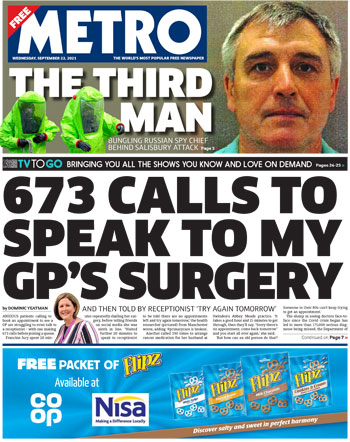
The campaign is bolstered by case studies, some of them truly horrifying, of missed diagnoses that led to delayed treatment, serious illness and even death. But while the paper may have the Prime Minister behind it, official government guidance is still for remote consultations where practicable. Maybe the Mail should be looking to Sajid Javid if it wants a change of approach.
The real scandal here, I would suggest, is not the refusal of GPs to allow patients into their surgeries, but their (or their reception staff’s) inability to answer the phone. This aspect made a secondary story on the “great surrender” spread yesterday and was also picked up – to greater effect – by other papers that hadn’t been beating the Mail’s face-to-face drum.
Metro’s “673 calls to speak to my GP’s surgery” splash made me sit up and take notice in a way no amount of Mail foot-stamping had managed.
So when the pandemic struck, it was surely the most natural thing in the world to use this much-trailed technology? Up to a point, Lord Copper.
The reshuffle pantomime
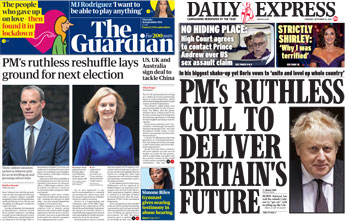
Cabinet reshuffles are much like football’s transfer deadline day, as the media critic Mic Wright pointed out last week. Commentators are required to fill hours of silent airtime with insights gleaned from standing in an empty street. If they’re lucky, they might see people coming or going, but so much is done out of sight on the phone that it will be days before the real stories emerge. When it is all over, most footballers will still be with the clubs they started with and most ministers will be back at the same departmental desk. Nevertheless, the pantomime must go on.
So how much has to change to make the story newsworthy? I don’t suppose I’d have been picked up much in winnings had I bet on Williamson being sacked or Raab being moved. A bit more for Jenrick, given that he is one of Johnson’s close coterie, or Buckland, largely because so few have heard of him that there wouldn’t be much of a run on his survival or sacrifice. But would you call the jettisoning of three Cabinet ministers and the demotion of a fourth “ruthless”? Especially when two of them had conspicuously failed in their roles and a third had not only shown questionable judgment, but also sparked a party rebellion with his planning plans? It doesn’t sound a lot to me. Yet that is how both the Express and the Guardian – papers at different ends of the political spectrum – saw it. And both interpreted it as laying the ground for the next election and the (Express only here) glorious future.
Politics certainly makes for strange bedfellows.
I don’t suppose I’d have been picked up much in winnings had I bet on Williamson being sacked or Raab being moved.
Another thankless task
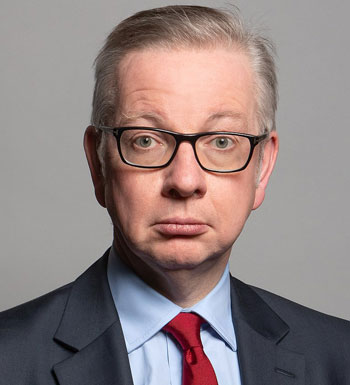
The slow burn of the reshuffle was the apparent rise of Michael Gove. I have a personal theory about Johnson giving him all the shitty jobs as revenge for the post-referendum front-stabbing: delivering Brexit (“Everyone will have the food they need”), sorting out Covid procurement (“Everyone will have the equipment they need”), and now housing and planning (“Everyone will have the homes they need – but not in your back yard”?). In the aftermath, we also learned that he had also been given responsibility for levelling up. Which sort of proves my theory, since even the Prime Minister was unable to explain in a much-trailed speech what this “policy” entailed. So now Mr Gove has responsibility for this election-winning label – and even a department renamed to include it – it is up to him to work out what it means.
Maybe the Sunday Telegraph could help him out, given that it seems so at ease with the term that it used it four times in a single paragraph about his appointment:
“Mr Gove, now the Levelling Up Secretary, is likely to lock horns with the Treasury as he seeks billions of pounds in funding for the levelling up agenda. Mr Gove will oversee the publication of a levelling up white paper setting out policies intended to "improve livelihoods, spread opportunity and drive economic growth". A senior Government source described Mr Gove's new role as an ‘underpriced move’ of the reshuffle", following claims that he had been demoted. ‘It's a colossus of a department,’ the source said of the new levelling up department.”
So now Mr Gove has responsibility for this election-winning label – and even a department renamed to include it – it is up to him to work out what it means.
In this fortnight’s headlines…
There follows a brief interlude of random thoughts about headlines:
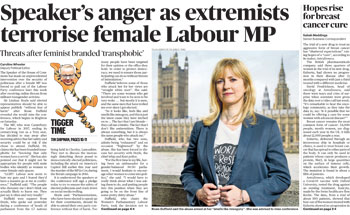
1. Did the Sunday Times really need the word “female” in its splash about Rosie Duffield. Especially as the story is accompanied by a large photograph of her?
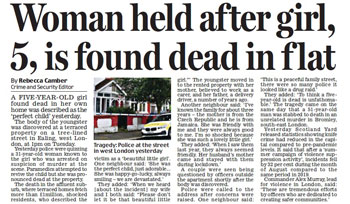
2. A rare slip from the uber-professional Mail team, starting the second line of this headline with the number 5 – which really needs to be on the same line as the word “girl” and the commas if you’re going to use that configuration.

3. Is the Strictly vaccine row really a “scandal”? There is no doubt that this is a valid story bringing into a new focus the various issues of personal freedom and societal responsibility, but a scandal? Like Profumo or Blunt or care homes? Hardly.
Incidentally, it’s interesting to note that the return of the competition provides fodder for almost every title – interviews with past winners, profiles of the new contestants, features on the presenters. Well, of course, you say. It’s a popular show. As is Bake-Off, which also returned this week. Quite. But much of this material appears in papers that take every opportunity to bash the BBC – or Channel 4, where Bake-Off now resides. They accuse them of bias, profligacy, failure to serve the public and myriad other sins. But that doesn’t stop them using the networks as a ready source of page fillings. And, joy of joys, a former Bake-Off winner is one of the Strictly contestants: John Whaite is partnering Johannes Radebe – who was recently on Celebrity Masterchef – in the show’s first all-male pairing. Reality TV, the gift that just keeps giving.
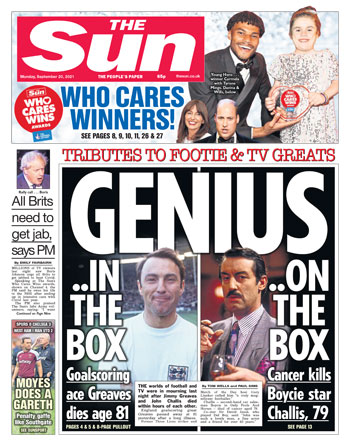
4. This is almost a neat piece of work on a pair of celebrity deaths. Or at least the “in” and “on” the box bit is. Was John Challis a genius? How many people could actually put a name to the actor who played Boycie? Or name other plays, films, TV programmes he had appeared in? Maybe the Sun was trying to reach readers too young to remember Jimmy Greaves. But Only Fools and Horses isn’t exactly a recent piece of television. Its last proper series ended 25 years ago, returning only for a three-episode Christmas special in 2003. TV comedy gold it may well have been, but it’s not what you’d call the go-to show for the youth market the Sun (and all papers intent on survival) needs to attract.
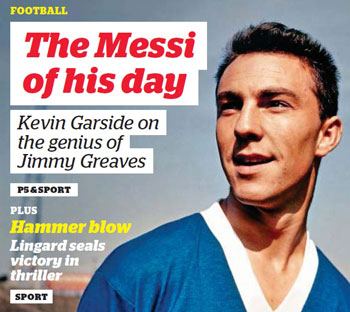
5. The i meanwhile went a step up from genius – if that’s possible – by describing Greaves as “the Messi of his day”. Er, no he wasn’t. He was a fabulous goal-scorer and some of his records stand to this day, but he was never in the Messi league. And remember in “his day”, Pele was playing.

6. I wonder how old the sub who wrote this Mirror headline on Emma Raducanu is. For those not brought up in the world of print, typespace is measured in “ems” and “ens” (as the names imply, the em is twice the width of en). When measuring type (and pictures), subs would use a special ruler marked not in inches or centimetres, but in ems. This was called an em rule. I still have one in my drawer. It’s made of plastic. Someone stole my brass one. Whether or not they intended this arcane allusion, cheers to whoever wrote this headline.
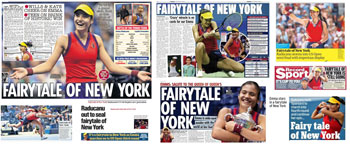
7. Sometimes headlines write themselves, sometimes you go for it too early – and sometimes it’s best to go off-piste. “Fairytale of New York” appeared 15 times in London and Scottish papers – in the Express (twice), Times, Mail, Guardian, Star, Independent, Mail on Sunday, Sun, Daily Star Sunday, Daily Record, Glasgow Herald, Evening Times, London Evening Standard and Scotsman.
Had any of them listened to the lyrics of the song?
Emma: an inconvenient time to win
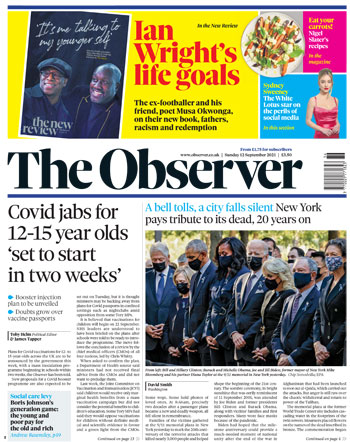
Still with our Emma, that fairytale ending was always going to be too late for the first editions – raising the old dilemma of what do you do when you know a big story is going to break after edition, so you’ve got no chance of getting it to your non-metropolitan readers?
It’s inescapable on election nights – but everyone knows that. It used to be the case with football. Even on Saturdays when everyone kicked off at 3 o’clock, the Pink ‘Un football specials could get the results only in the “late news” panel on the back page – the fudge. Reporters would have to file at half-time; all that was allowed after that was an update for the final score and “additional scorers”. Squirreled away in my attic is a faded cutting of one such report. The game was dull, dull, dull and inside the paper were 350 words on quite how dull. A couple of lines in the fudge told a different story: the match ended 5-4 and the additional scorers included two with hat-tricks.
The problem didn’t disappear with the Murdoch revolution that promised greater control for journalists and later deadlines. They lasted barely five minutes. But there came a realisation that no paper worth its salt could go to press without the midweek football results. Special provisions were made to hold the presses or, at the very least, stop them to take an early slip. You might have thought the same would apply to the New York Open final. Apparently not.
Raducanu won at 11.13pm. The Observer’s third edition front page went at 10pm. The main image was from New York, but instead of a vibrant 18-year-old woman, it was of a group of ageing politicians – including three presidents – commemorating the 20th anniversary of the 9/11 attacks. A serious picture for a serious-minded newspaper? Maybe, but, my, it looked out of place on Sunday morning. There was no mention of the tennis on the front – even in the puff, which guided readers to Ian Wright’s life goals. Was the decision it was better to have nothing than a hopeful picture if she lost? Is there still a belief that football is the only sport that matters?
But it didn’t look good on the news stand. Has the Observer completely given up on casual sales?
Tennis vs football
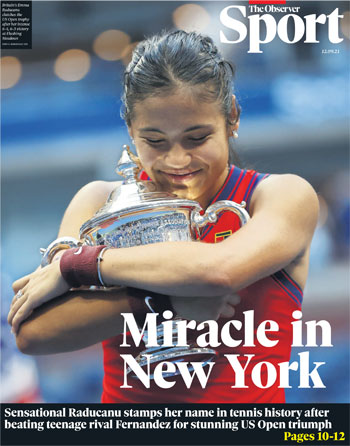
Meanwhile the sport section cover was a joyous “Miracle in New York” poster. The page went offstone at midnight. It may have made sense to give all the change-up facilities to sport as it was clearly going to be more in need. But it didn’t look good on the news stand. Has the Observer completely given up on casual sales?
It was nowhere on the Star front either. Its readers were served a Geronimo splash, a puff dominated by Ronaldo’s first appearance back with Manchester United, a pair of busty reality TV (Strictly and Towie) women, and a couple of free offers. Indeed, the tennis was not only nowhere in the news section, it was even hidden in the sports pages – Ronaldo was all over the back and the first inside spread. You had to go forwards seven pages to get to the tennis.
This was bonkers. Raducanu’s adventure in New York wasn’t just about sport. It was a quite incredible human story. But the Star had its blinkers on: it’s sport, so push it to the back; it’s not football, so push it further inside. Having the Sunday night B team in charge, possibly scared of deviating from the usual rules, might have explained the initial oversight (hint: if you’re left in charge of the paper and something happens late at night, it’s always better to over-react than to do nothing). Or maybe they were under explicit orders to ignore the tennis – and made their displeasure known with the splash strapline “The final insult”. Such gestures of defiance are not unknown.
By Monday, everyone had a chance to catch up and so our new heroine was everywhere. Or almost everywhere. The I had a court shot for its front-page picture, which was a strange choice when there was that glamorous evening photo – complete with cup – available. The Mail, God help us, repeated the “can’t savour the moment” approach last seen at the Olympics with a “now for the gong” splash. I guess they were desperate for a “fresh” follow-up line, but this shouldn’t have been it.
The Times hedged its bets with £20m, £100m and £150m all on the same spread.
Pick a number
It also went for the more obvious day two angle: this young lady is going to become very rich (she already is, having just won $2.5m). Most papers had dollar (or pound) signs in their eyes: the Mail went for £150m, the Mirror £100m, the Express $1bn – all figures plucked out of the air. And that was just the front pages. Inside, the i had “sport’s first billion-dollar girl”, the Telegraph said she was “expected to become the wealthiest female athlete of all time”, the Times hedged its bets with £20m, £100m and £150m all on the same spread.
Talking of bets, the Sun focused on others coining it, including one punter who won £1,870 for a £3.74 stake.
Yet still Ms R was nowhere to be found on the Star front page. The 143 words on page 7 were the sum total of news coverage and her triumph was still third fiddle to F1 and football in sport. This continued neglect was really weird. After all, the paper splashed on the knock-on effect 13-year-old Sky Brown winning an Olympic bronze for skateboarding. I think it’s fair to say that Emma will become a rather more influential role model.
Front page of the fortnight
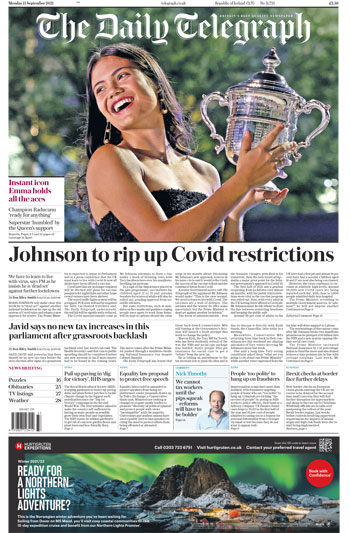
For me, the Telegraph had the most pick-me-up Emma front page. It’s a stunning picture and not spoilt with too much type overlay, which was the undoing of both the Mail and the Times.
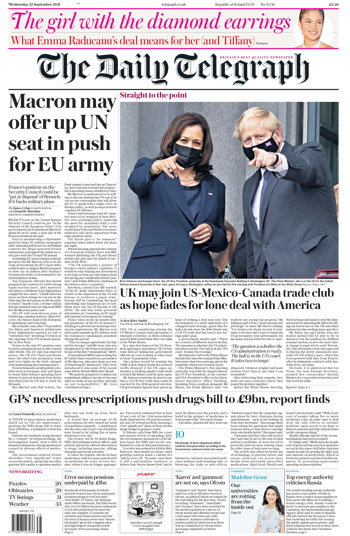
But the Telegraph also won the booby prize for the best put-down when yesterday’s splash prompted this tweet from the Elysée Palace.
Contrairement aux affirmations du tabloïd anglais Daily Telegraph relayées ce matin, non, la France n’a pas proposé de laisser son siège au Conseil de sécurité des Nations unies. Il est à la France et le restera.
— Élysée (@Elysee) September 22, 2021
It’s bad enough having the French President saying you’re wrong. But the bit that will have hurt for a newspaper that still sees itself as a quality broadsheet is to be described as “the English tabloid”. Ouch!
Liz Gerard’s Notebook is a fortnightly column published in the InPubWeekly newsletter. To be added to the mailing list, enter your email address here.








